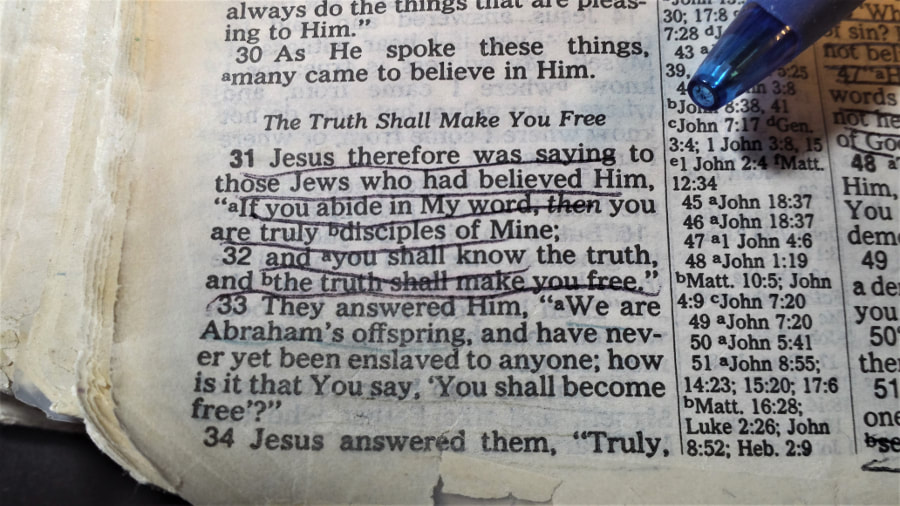Photo Copyright: hydromet
"For God did not send the Son into the world to judge the world, but that the world might be saved through Him." (John 3:17)
"The thief comes only to steal and kill and destroy; I came that they may have life, and have it abundantly." (John 10:10) "For the Son of Man has come to seek and to save that which was lost." (Luke 19:10)
This lesson explains 11 biblical reasons why Jesus Christ came into the world. Ten of these reasons are in the words of Jesus himself.
Consider. If an unbeliever or an inquisitive new believer were to ask you, "Why did Jesus come into the world?," what would you say?
1. Jesus Came to Fulfill the Law and the Prophets
Early in his ministry, it was important for Jesus to establish why he came (Ref. 1). Jesus said to his hearers, "Do not think that I came to abolish the Law or the Prophets; I did not come to abolish but to fulfill" (Matthew 5:17). To Jesus, the scriptures were absolutely authoritative (Luke 24:44). Jesus came to cause God's will in the law (the first five books of the Old Testament) to be obeyed as it should be. Jesus also came to fulfill the prophecies and promises in the writings of the prophets, Psalms, and the other books of the Old Testament (Thayer's Greek Lexicon - Ref. 2).
2. Jesus Came to Save the World
Jesus spoke the following famous words in John 3:16, "For God so loved the world, that He gave His only begotten Son, that whoever believes in Him shall not perish, but have eternal life." Then Jesus continued the thought in John 3:17. "For God did not send the Son into the world to judge the world, but that the world might be saved through Him" (John 3:17). The Greek word for saved is sózó (pronounced sode'-zo) and means deliver out of danger and into safety; used principally of God rescuing believers from the penalty and power of sin – and into His provisions (safety) (Ref. 3). Because God in love sent his Son to save the world, Jesus has already delivered you and me -- all those who believe in him -- out of danger into his safety.
3. Jesus Came into the World to Save Sinners
The Apostle Paul wrote, "It is a trustworthy statement, deserving full acceptance, that Christ Jesus came into the world to save sinners, among whom I am foremost of all" (1 Timothy 1:15). Sinners are hamartólos -- people who "fall short of what God approves, i.e. what is 'wide of the mark'" (Ref. 4). That category, "sinners," actually includes all of us -- "for all have sinned and fall short of the glory of God" (Romans 3:23).
4. Jesus Came to Preach the Kingdom of God
When Jesus went out from Capernum to a solitary place (Luke 4:31, Luke 4:42), he told the multitudes who were searching for him, "I must preach the kingdom of God to the other cities also, for I was sent for this purpose" (Luke 4:43). Jesus also used the same word for preach when he quoted Isaiah 61:1 -- "The Spirit of the Lord is upon Me, Because He anointed Me to preach the gospel to the poor" (Luke 4:18). In Luke 4:18 and Luke 4:43, the Greek word for preach is euaggelizó (pronounced yoo-ang-ghel-id'-zo) which means to "proclaim the good news" (Ref. 5).
5. Jesus Came Down from Heaven to Do the Father's Will
Jesus said to the people, "All that the Father gives Me will come to Me, and the one who comes to Me I will certainly not cast out. For I have come down from heaven, not to do My own will, but the will of Him who sent Me" (John 6:37-38).
In John 6:40, Jesus explained what the will of his Father was in sending him. "For this is the will of My Father, that everyone who beholds the Son and believes in Him will have eternal life, and I Myself will raise him up on the last day." It is the Father's will that everyone who believes in his Son may have eternal life. If you would like to read more about eternal life, please see "What Is Eternal Life?" (Ref. 6) 6. Jesus Came into this World so that Those Who Do Not See May See
In John 9:1-12 Jesus healed the sight of a man who had been blind from birth. The formerly blind man testified to the Pharisees about Jesus, but they refused to "see" and believe in Jesus (John 9:13-34). The Pharisees then put the formerly blind man out of the synagogue (John 9:22, John 9:34). After the formerly blind man had been put out of the synagogue, Jesus found him, and the man who could now see physically and spiritually worshiped Jesus as Lord (John 9:35-38). Jesus then said in the presence of the Pharisees, "For judgment I came into this world, so that those who do not see may see, and that those who see may become blind" (John 9:39).
7. Jesus Came that We May Have Life and Have it Abundantly
In John 10:8-10 Jesus said, "All who came before Me are thieves and robbers, but the sheep did not hear them. I am the door; if anyone enters through Me, he will be saved, and will go in and out and find pasture. The thief comes only to steal and kill and destroy; I came that they may have life, and have it abundantly." The Greek word for abundantly is perissos (pronounced per-is-sos') and means all-around, beyond what is anticipated, exceeding expectation, "more than enough" (Ref. 7). In the words of the Amplified Bible, Jesus said, "The thief comes only in order to steal and kill and destroy. I came that they may have and enjoy life, and have it in abundance [to the full, till it overflows]" (John 10:10 AMP).
8. Jesus Came to Serve and to Give His Life as a Ransom for Many
Jesus said about himself, "The Son of Man did not come to be served, but to serve, and to give His life a ransom for many" (Matthew 20:28). When Jesus said he came to serve, the word in the Greek text is diakoneó which means to minister and to care for the needs of others, for example, as a slave waiting on table for guests (Ref. 8). When Jesus said that he came to give his life as a ransom for many, the word in the Greek text for ransom is lutron (pronounced loo'-tron) which was the price to free a slave (Ref. 9). The ransom price that Jesus paid to free us from slavery to sin was his blood (1 Peter 1:18-19, Hebrews 9:11-12).
9. Jesus Came to Seek and Save that which Was Lost
Notice in Luke 19:1-2 that Zaccheus was a tax gatherer, a person despised by the Jews and the religious leaders of Jesus' day. Yet, God gave Zaccheus the desire to see Jesus (Luke 19:3-4). Jesus extended his grace to Zaccheus and said he wanted to stay at Zaccheus' home (Luke 19:5). Zaccheus indicated his conversion, his turning away from sin when he stated that he would repay anyone he had defrauded (Luke 19:8). Jesus then said, "Today salvation has come to this house, because he, too, is a son of Abraham. For the Son of Man has come to seek and to save that which was lost" (Luke 19:9-10).
The Greek word for lost, apollumi (pronounced ap-ol'-loo-mee), has a severe meaning, and we need to pay attention. Apollumi (being lost) implies to die with the implication of ruin and permanent (absolute) destruction by experiencing a miserable end (HELPS Word-studies - Ref. 10). "Jesus Christ came to save Zaccheus, you, and me from experiencing ruin, permanent destruction, and a miserable end" (Ref. 11). For further study on the nature of God to seek and save the lost, read the parables of The Lost Sheep, The Lost Coin, and The Prodigal Son in Luke 15:1-32. 10. Jesus Came as Light into the World
Jesus said, "I have come as Light into the world, so that everyone who believes in Me will not remain in darkness" (John 12:46). Jesus came as light into the world so that everyone who believes in (has faith in, trusts in - Ref. 12) him shall not remain in (abide in, stay in - Ref. 13) darkness (moral and spiritual obscurity which blocks the light of God when faith is lacking - Ref. 14). Without Christ, man is in darkness. When we believe in Christ, God transfers us from the domain of darkness to the kingdom of His Son (Colossians 1:13).
11. Jesus Came into the World to Bear Witness to the Truth
Early in the morning on the day he was to be crucified, Jesus stood before Pilate. Pilate said to him, "So you are a king?" (John 18:37). Jesus answered, "You say that I am a king. For this purpose I was born and for this purpose I have come into the world—to bear witness to the truth. Everyone who is of the truth listens to my voice" (John 18:37). The Greek noun for truth, alétheia, means reality — the opposite of what is false or illusion (HELPS Word-studies - Ref. 15). Jesus came to testify, to be a witness to us about the reality of God's truth. Listen to his voice. He is the Truth (John 14:6).
Prayer. Thank you, Jesus, for coming into the world to save sinners, including me (1 Timothy 1:15). Help me to share the truth of your word with others so they, too, will trust in you as their Savior and Lord.
Related Lessons
"Biblical Definition of the World" (John 1:10) "What is Eternal Life?" (John 17:3) "What is Redemption?" (Ephesians 1:7) "What Does 'To Be Saved' Mean in the New Testament?" (Acts 16:31) "Jesus - Witness to the Truth" (John 18:37)
References
1. https://biblehub.com/commentaries/barnes/matthew/5.htm 2. https://biblehub.com/greek/4137.htm 3. https://biblehub.com/greek/4982.htm 4. https://biblehub.com/greek/268.htm 5. https://biblehub.com/greek/2097.htm 6. https://www.scriptureway.com/home/what-is-eternal-life 7. https://biblehub.com/greek/4053.htm 8. https://biblehub.com/greek/1247.htm 9. https://biblehub.com/greek/3083.htm 10. https://biblehub.com/greek/622.htm 11. https://www.scriptureway.com/home/what-does-to-be-saved-mean-in-the-new-testament 12. https://biblehub.com/greek/4100.htm 13. https://biblehub.com/greek/3306.htm 14. https://biblehub.com/greek/4653.htm 15. https://biblehub.com/greek/225.htm
3 Comments
"Be on the alert, stand firm in the faith, act like men, be strong. Let all that you do be done in love." (1 Corinthians 16:13-14)
This article explains the Apostle Paul's exhortation to the Corinthian church to be alert, stand firm in the faith, act like men, be strong, and be loving (1 Corinthians 16:13-14).
Consider. In what areas of your personal life today are you being challenged to stand firm in your faith in Christ? In what areas is the church of Christ being challenged today to stand firm in our faith in Christ and the word of God?
Introduction
The Apostle Paul concludes his letter to the Corinthian church with a concise and sharp series of exhortations. The first four exhortations in 1 Corinthians 16:13 - be alert (be watchful), stand firm in the faith, act like men (be courageous), and be strong - are like "pistol shots" or shouted military commands (Ref. 1). In contrast, the last exhortation in 1 Corinthians 16:14 - "Let all that you do be done in love" - is more gentle.
Paul loved the church at Corinth, and he spent much time teaching them (Acts 18:1, 5, 11). Even though Paul loved them and had taught them about Christ, he was concerned that they were "schismatic and factious," "ill-grounded in regard to very fundamental doctrines of the faith," undisciplined, and incapacitated for "vigorous warfare" (Ref. 1). Paul includes these sharp and emotional exhortations at the end of his letter to help them preserve their souls and to stand firm against the enemies of truth. Be On the Alert
The Greek word for be on the alert is grégoreó. Grégoreó means literally, stay awake, and figuratively, be vigilant, responsible, and watchful (Ref. 2). Paul's exhortation to the Corinthian church (to be alert, watchful) applies equally to us as believers in Christ today. Paul urged the Corinthian church to guard constantly against evils such as dissension, erroneous doctrine, false teaching, and temptations, "lest the enemies of truth and of holiness should steal upon them and surprise them" (Ref. 3). "They were to watch with the same vigilance that is required of a sentinel who guards a camp, lest an enemy should suddenly come upon them, and surprise the camp when the army was locked in sleep" (Ref. 3).
Stand Firm in the Faith
The Greek word for stand firm in 1 Corinthians 16:13 is stékó which means to persist, persevere, and stand fast (Ref. 4). The Greek word for faith is pistis which means belief, trust, faith, and confidence (Ref. 5). As believers in Christ, in addition to being watchful, we are to stand firm in the faith - that is, stand firm in our belief, trust, and confidence in Christ and in the word of God. I suggest these biblical examples for standing firm in the faith:
a. Believing in and defending the truths of the Bible
All of God's word is the truth. "The sum of Your word is truth,
And every one of Your righteous judgments is everlasting" (Psalm 119:60). Jesus Christ himself is the truth. "I am the way, and the truth, and the life; no one comes to the Father except through Me" (John 14:6). b. Believing in and relying upon the inspiration and authority of the Bible
"All Scripture is inspired by God and profitable for teaching, for reproof, for correction, for training in righteousness; so that the man of God may be adequate, equipped for every good work" (2 Timothy 3:16-17).
c. Maintaining full confidence in our Lord and Savior Jesus Christ
We are able to stand firm not because of ourselves but because of who we trust -- Jesus Christ. David wrote, "My help comes from the Lord, who made heaven and earth" (Psalm 121:2). Paul wrote, "I can do all things through Christ who strengthens me" (Philippians 4:13).
d. Remaining faithful to God when we encounter temptation
"No temptation has overtaken you but such as is common to man; and God is faithful, who will not allow you to be tempted beyond what you are able, but with the temptation will provide the way of escape also, so that you will be able to endure it" (1 Corinthians 10:13). "How can a young man keep his way pure? By guarding it according to your word. (11) I have stored up your word in my heart, that I might not sin against you" (Psalm 119:9, 11).
e. Trusting God through distress and affliction
"Many are the afflictions of the righteous, but the Lord delivers him out of them all" (Psalm 34:19).
f. Being faithful (with love) to biblical standards, not comprising our standards to mimic world culture
In contrast to imitating the world, Jesus said that we (and his church) are to be salt and light (Matthew 5:13-16). We are to love others (John 13:34-35, Matthew 5:43-44) but not love the things or the lusts of the world (1 John 2:15-16).
Act Like Men (Be Courageous and Brave)
Paul uses the Greek word andrizó, which the 1995 New American Standard Bible translates as act like men (Ref. 6). Andrizó means "properly, to act as a full-grown, mature man; (figuratively) to be responsible and courageous by taking the initiatives God reveals through faith" (HELPS Word-studies, Ref. 7). Note the connection in the Greek definition between God providing the Christian believer faith and the Christian believer being courageous and brave to stand firm. The Greek word andrizó (act like men) occurs only once in the New Testament - here in 1 Corinthians 16:13 (Englishman's Concordance, Ref. 7).
Paul's message applies to both male and female believers today. We are to be spiritually mature, courageous, and brave as we stand firm in the faith. Be Strong
In 1 Corinthians 16:13 Paul uses an unusual word which is translated as be strong. The Greek word used here for be strong is krataioó. Krataioó (be strong) means to prevail by God's dominating strength working in the believer through faith (Ref. 8). Paul uses the same Greek word krataioó in his prayer for the church at Ephesus. "For this reason I bow my knees before the Father, from whom every family in heaven and on earth derives its name, that He would grant you, according to the riches of His glory, to be strengthened with power through His Spirit in the inner man ..." (Ephesians 3:14-16, italics added).
Let All That You Do Be Done in Love
Paul transitions from the captain's words of command in 1 Corinthians 16:13 to the gentler exhortation, "Let all that you do be done in love" (1 Corinthians 16:14). The Greek word for love in this verse is agapé, which means divine love (what God prefers) (Ref. 9). As believers in the Lord Jesus Christ, when we stand firm in the faith, we are to show God's divine love to others in everything that we say and do. Paul describes the love we are to show others when he wrote, "Love is patient, love is kind and is not jealous; love does not brag and is not arrogant, does not act unbecomingly; it does not seek its own, is not provoked, does not take into account a wrong suffered ..." (1 Corinthians 13:4-5).
Apply. In what area of your personal life do you need God's strength to help you stand firm and be faithful to God? What can you do to help the church of Christ today to love others while standing firmly for faith in Christ and God's word?
References
1. https://biblehub.com/commentaries/maclaren/1_corinthians/16.htm 2. https://biblehub.com/greek/1127.htm 3. https://biblehub.com/commentaries/barnes/1_corinthians/16.htm 4. https://biblehub.com/greek/4739.htm 5. https://biblehub.com/greek/4102.htm 6. https://www.biblegateway.com/passage/?search=1+Corinthians+16%3A13&version=NASB 7. https://biblehub.com/greek/407.htm 8. https://biblehub.com/greek/2901.htm 9. https://biblehub.com/greek/26.htm
Then Pilate said to him, "So you are a king?" Jesus answered, "You say that I am a king. For this purpose I was born and for this purpose I have come into the world—to bear witness to the truth. Everyone who is of the truth listens to my voice." (John 18:37)
This lesson is the fifth and final in the series, "About the Truth."
Consider. Do you consider yourself to be a person “of the truth”? Are you listening to the voice of Jesus who is the truth?
Introduction. In today's scripture (John 18:37), Jesus was facing Pilate, the representative of the highest political authority on earth (Ref. 1). Jesus courageously and nobly said to Pilate that he was born to be a king and came into the world - to bear witness to the truth. Ellicott's Commentary says the natural interpretation (based on Greek verb tenses) is "To be king I have been born, and to be a king I have come into the world, in order that I may bear witness to the truth" (Ref. 2).
Pilate asked Jesus, "So you are a king?" (John 18:37). However, Jesus' kingdom was not a kingdom in the political sense that Pilate inferred (Ref. 1, Ref. 3). Jesus' kingdom was a kingdom in the spiritual sense (Ref. 4). Jesus said, "My kingdom is not of this world" (John 18:36). Jesus said, "For this purpose I have come — to bear witness to the truth."
Let's look at the meaning of the words for bear witness and truth. The English words bear witness are translated from the Greek verb martureó, which means bear witness, give evidence, testify, give a good report (Ref. 5). The Greek noun for truth is alétheia, which means reality, the opposite of what is false or illusion (Ref. 6). Jesus came into the world to show and tell mankind that God's truth is reality.
Consider these statements where Jesus bears witness to God's truth -- reality. "I am the way, and the truth, and the life; no one comes to the Father but through Me" (John 14:6). "If you continue in My word, then you are truly disciples of Mine; and you will know the truth, and the truth will make you free" (John 8:31-32). "For God so loved the world, that He gave His only begotten Son, that whoever believes in Him shall not perish, but have eternal life" (John 3:16). The above verses and the entirety of the Holy Bible are God's truth and are reality. "The entirety of Your word is truth, and all Your righteous judgments endure forever" (Psalm 119:160). Jesus said, "Everyone who is of the truth listens to my voice."
To whom is Jesus referring when he says "Everyone who is of the truth listens to my voice"? (John 18:37) People of the truth are people who listen to the voice of him who is the truth (Ref. 7). Jesus said, "My sheep hear My voice, and I know them, and they follow Me" (John 10:27).
Listening to (hearing) Jesus' voice prompts obedience (Ref. 8). People who are of the truth hear Jesus' words and yield obedience to him. Jesus said, "If you love me, you will keep my commandments" (John 14:15).
Apply. Listen to the voice of Jesus who has testified about God’s truth, which is reality. Testify to others about the reality of God in your life. Obey God’s words.
Related Lessons
"God's Truth in the Old Testament" (Psalm 119:160) "Jesus is the Truth" (John 14:6) "Know the Truth (John 8:32)" "The Spirit of Truth" (John 16:13-14)
References
1. https://biblehub.com/commentaries/jfb/john/18.htm 2. https://biblehub.com/commentaries/ellicott/john/18.htm 3. https://biblehub.com/commentaries/pulpit/john/18.htm 4. https://biblehub.com/commentaries/poole/john/18.htm 5. https://biblehub.com/greek/3140.htm 6. https://biblehub.com/greek/225.htm 7. https://biblehub.com/commentaries/ellicott/john/18.htm 8. https://biblehub.com/greek/191.htm
Copyright: digitalskill / 123RF Stock Photo
"But when He, the Spirit of truth, comes, He will guide you into all the truth; for He will not speak on His own initiative, but whatever He hears, He will speak; and He will disclose to you what is to come. He will glorify Me, for He will take of Mine and will disclose it to you." (John 16:13-14)
"The Holy Spirit is our Guide, not only to show us the way, but to go with us by continued aids and influences." -- Matthew Henry (Ref. 1)
This lesson is the fourth in the series, "About the Truth." Today's lesson focuses on the role of the Holy Spirit as the "Spirit of Truth."
Consider.
Jesus promised his disciples that the Spirit of truth would come.
Jesus was speaking to his disciples on the evening before his death. In the beginning of John 16:13, Jesus told them that the Spirit of truth would come. God fulfilled the promise of sending the Holy Spirit, the Spirit of truth, beginning at Pentecost (Acts 2:1-4). Jesus' promise of sending the Holy Spirit, the Spirit of truth, continues for believers to this day (Acts 2:37-39).
The Spirit of truth guides believers into all the truth.
The Greek word in John 16:13 for guide is the verb, hodégeó. Strong's Concordance tells us that hodégeó means to show the way -- to teach, guide, lead (Ref. 2).
In Acts 8:25-40, we see an example of what it means to guide. An angel of the Lord sent Philip to the road that descends from Jerusalem to Gaza (Acts 8:26). There Philip met the chariot of an Ethiopian eunuch who was returning from Jerusalem. At the Spirit's direction, Philip joined the eunuch in the chariot (Acts 8:29). The eunuch was reading Isaiah the prophet. Philip asked him, "Do you understand what you are reading?" (Acts 8:30) The eunuch replied, "Well, how could I unless someone guides me?" (Acts 8:31, italics added) Philip explained the scripture to the eunuch and "preached Jesus to him" (Acts 8:35). As the result, the Ethiopian eunuch believed that Jesus Christ is the Son of God (Acts 8:37), and Philip baptized him (Acts 8:38). Note what Jesus said in John 16:13. "He (the Spirit of truth) will guide you into all the truth." In his commentary, Charles John Ellicott (1819–1905) says that the words, "all the truth," mean that the Spirit of truth "will be their guide into the fulness [sic] of truth." Ellicott adds, "The promise has special meaning for the disciples to whom it was spoken; but it holds good for every disciple who seeks to know the truth" (Ref. 3, Ref. 4). The Spirit of truth speaks what he has heard from the Father and the Son.
The Holy Spirit does not speak from himself. The Holy Spirit fulfills his mission when he speaks truth directly from the Father and Son to the believer. The King James Version translates the verse well. "When he, the Spirit of truth, is come, he will guide you into all truth: for he shall not speak of himself; but whatsoever he shall hear, that shall he speak" (John 16:13, italics added).
The Spirit of truth glorifies the Son.
Jesus said, "He will glorify Me, for He will take of Mine and will disclose it to you" (John 16:14). The Greek word for glorify in John 16:14 is doxazó, which means make glorious, honor, magnify (Ref. 5 below). Doxazó is very similar to the Greek word doxa, which means to honor, praise, worship (Ref. 5). When we sing the Doxology in a worship service we express our praise and worship of God (Ref. 6). When the Holy Spirit guides us into truth, it is an act of worship that glorifies Jesus, the Son of God.
Prayer. Thank you, Lord, for sending the Spirit of truth to be with us and to guide us into all of your truth.
Related Lessons
"God's Truth in the Old Testament" (Psalm 119:160) "Jesus is the Truth" (John 14:6) "Know the Truth (John 8:32)" "Jesus - Witness to the Truth" (John 18:37)
References
1. https://biblehub.com/commentaries/mhc/john/16.htm 2. https://biblehub.com/greek/3594.htm 3. https://biblehub.com/commentaries/john/16-13.htm 4. https://en.wikipedia.org/wiki/Charles_Ellicott 5. James Strong, "The New Strong's Exhaustive Concordance of the Bible," Thomas Nelson Publishers, 1995 - note, based on the King James Version of the Bible 6. http://www.hymntime.com/tch/htm/d/o/x/doxology.htm
"Then Jesus said to those Jews who believed Him, 'If you abide in My word, you are My disciples indeed. And you shall know the truth, and the truth shall make you free.' " (John 8:31-32)
This lesson is the third in the series, "About the Truth." The first lesson was "God's Truth in the Old Testament" where we learned that God's Word in its entirety is truth (Psalm 119:160). The second lesson was "Jesus is the Truth" based on John 14:6. This lesson discusses Jesus' instructions to believers to abide in the Word and to know the truth experientially.
Consider.
To whom was Jesus speaking?
When Jesus spoke the promise, "You shall know the truth, and the truth shall make you free," Jesus was speaking to people who believed him. That is, Jesus was speaking to people who had faith in him and who trusted him. The beginning of John 8:31 states, "So Jesus was saying to those Jews who had believed Him ..."
Believe in Jesus.
Jesus does not ask us to believe a truth, or any truth (Ref. 1). Jesus asks us to believe that He is the truth (John 14:6). If you have never put your trust in Jesus, or if you have strayed away from Jesus, put your trust in him today. Believing in Jesus who is the Truth will set you free from slavery to sin, and will give you eternal life.
"Therefore there is now no condemnation for those who are in Christ Jesus. For the law of the Spirit of life in Christ Jesus has set you free from the law of sin and of death" (Romans 8:1-2). "For God so loved the world, that He gave His only begotten Son, that whoever believes in Him shall not perish, but have eternal life" (John 3:16). Abide in the Word and know the truth experientially.
Jesus says to believers in the second portion of John 8:31 and in verse 32, "If you abide in My word, you are My disciples indeed. And you shall know the truth, and the truth shall make you free." The Greek word for abide is menó which means remain, abide (Ref. 2). As believers in Christ, we are to abide in the Word, and persevere in studying, learning, and applying God's Word.
Jesus says that if we abide in the Word we will know the truth experientially (John 8:31-32). The Greek word for know is ginóskó which means to know, especially through personal experience (first-hand acquaintance) (Ref. 3). Knowing the truth experientially requires knowing Jesus who is the truth, as well as knowing and living the Word of God on a daily and life-long basis.
Jesus says that if we abide in the Word we will know the truth and the truth will make us free (John 8:31-32). The Greek verb make free is eleutheroó which means liberate, set free, release from bondage (Ref. 4). When we trust Jesus as our Lord and Savior, abide in his Word, and grow in knowledge of his truth, we are set free from slavery to sin. Jesus says, "Truly, truly, I say to you, everyone who commits sin is the slave of sin" (John 8:34). "So if the Son makes you free, you will be free indeed" (John 8:36).
Billy Graham Quote
I will end this post with a quote from Billy Graham's message, "What is Truth?" (Ref. 1)
"Turn to Christ—to the truth. Jesus said, 'You shall know the truth, and the truth shall make you free' (John 8:32). He said, 'I am … the truth' (John 14:6). Jesus did not say, 'You shall know a truth' or 'any truth' but 'the truth.' He’s the embodiment of all truth. Jesus said, 'If you do not believe that I am He, you will die in your sins' (John 8:24). If you don’t believe that and don’t accept Christ, you will die in your sins and you’ll be lost. Jesus Christ claimed to be ultimate truth. Are you willing to face the truth?" (Ref. 1)
Apply. Are you willing to face the ultimate truth of Jesus Christ? Will you put your faith and trust in him? What steps will you take to abide in God's Word and to grow in your knowledge of the truth?
Related Lessons
"God's Truth in the Old Testament" (Psalm 119:160) "Jesus is the Truth" (John 14:6) "The Spirit of Truth" (John 16:13-14) "Jesus - Witness to the Truth" (John 18:37)
References
1. https://billygraham.org/decision-magazine/march-2017/classic-message-billy-graham-truth/ ©1985 Billy Graham Evangelistic Association. Used with permission. All rights reserved. 2. https://biblehub.com/greek/3306.htm 3. https://biblehub.com/greek/1097.htm 4. https://biblehub.com/greek/1659.htm
Jesus said to him, "I am the way, and the truth, and the life; no one comes to the Father but through Me" (John 14:6).
"Truth is not defined by our own subjective standards; it is determined by the Source of truth Himself" (R.C. Sproul - Ref. 1).
This is the second lesson in the series, "About the Truth." The first lesson described God's Truth in the Old Testament. Today we begin to examine what the New Testament says about God's truth.
Definition. The Greek word for truth in the New Testament is alétheia, pronounced phonetically as "al-ay'-thi-a." In ancient Greek culture, alétheia was synonymous for "reality" as the opposite of illusion, i.e. fact (Ref. 2).
Alétheia occurs 109 times in the New Testament (Ref. 2). John's gospel and John's letters (1 John, 2 John, 3 John) mention truth the most often, where alétheia is mentioned 47 times. According to Strong's Exhaustive Concordance (Ref. 3 below), Jesus verbally mentioned truth (alétheia) 26 times. The first reference is Luke 4:25-26. The last reference is John 18:37, which we will examine later in this lesson series.
Consider. Let's consider what Jesus' critics said about Jesus and what Jesus said about himself in regard to the truth.
Jesus' critics recognized that Jesus taught the truth.
In Matthew 22:15-22, the Pharisees went to Jesus with a question intended to trap him. Verse 16 tells us, "And they sent their disciples to Him, along with the Herodians, saying, "Teacher, we know that You are truthful and teach the way of God in truth, and defer to no one; for You are not partial to any."
Perhaps the Pharisees were being falsely complimentary of Jesus because they did not believe in him (Barnes in Ref. 4). However, this was "an admission from the lips of adversaries of the supreme truthfulness and fearlessness of our Lord’s teaching" (Ellicott in Ref. 4). In either case, the words of Jesus' critics recognized that Jesus was truthful (aléthés, unconcealed) and that he taught the truth (alétheia, reality) (Ref. 2, Ref. 5). Jesus is the Truth.
On the evening before his death, Jesus told his disciples that he was about to leave them (John 13:33). Thomas asked Jesus, "Lord, we do not know where You are going, how do we know the way?" (John 14:5). Jesus replied, "I am the way, and the truth, and the life; no one comes to the Father but through Me" (John 14:6).
When Jesus said that he is the truth, he was saying that he is the embodiment and fulfillment of the Word of God, and that he is alétheia, reality, the opposite of what is false or illusion. In the previous post (July 15, 2018), we read Psalm 119:160, "The entirety of Your word is truth, and all Your righteous judgments endure forever." In the Sermon on the Mount, Jesus said, "Do not think that I came to destroy the Law or the Prophets. I did not come to destroy but to fulfill" (Matthew 5:17). John begins his gospel with, "In the beginning was the Word, and the Word was with God, and the Word was God" (John 1:1). When Jesus prayed with the Father on the evening before his death, Jesus said, "Thy word is truth" (John 17:17). Jesus not only taught the truth, but also embodied the truth perfectly because he (and only he) was sinless and because Jesus is God (Luke 23:39-41, Hebrews 4:15, John 8:58, Exodus 3:6).
Apply. Jesus said, "I am the way, and the truth, and the life; no one comes to the Father but through Me" (John 14:6). Do you agree that Jesus rather than man is the Source of truth?
Related Lessons
"God's Truth in the Old Testament" (Psalm 119:160) "Know the Truth (John 8:32)" "The Spirit of Truth" (John 16:13-14) "Jesus - Witness to the Truth" (John 18:37)
References
1. https://www.ligonier.org/learn/devotionals/god-truth/References 2. http://biblehub.com/greek/225.htm 3. James Strong, "The New Strong's Exhaustive Concordance of the Bible," Thomas Nelson Publishers, 1995 - note, based on the King James Version of the Bible 4. http://biblehub.com/commentaries/matthew/22-16.htm 5. http://biblehub.com/greek/227.htm
"The entirety of Your word is truth, and all Your righteous judgments endure forever" (Psalm 119:160).
This article is the first in the series, "About the Truth." This article focuses on what the Old Testament says about God's truth.
The Truth of God in the Old Testament
Definition. The main Hebrew word for "truth" in the Old Testament is emeth. Emeth means "firmness, faithfulness, truth" (Ref. 1).
The word emeth first occurs in Genesis 24:27, when Abraham's servant completes his journey to find a bride for Abraham's son, Isaac. “Blessed be the Lord God of my master Abraham, who has not forsaken His mercy and His truth toward my master. As for me, being on the way, the Lord led me to the house of my master’s brethren.”
Consider. Let's look together at several verses which describe the attributes, or characteristics, of God's truth.
God's commandments are truth itself.
"Your righteousness is an everlasting righteousness, And Your law is truth" (Psalm 119:142).
"You are near, O Lord, And all Your commandments are truth" (Psalm 119:151). "The entirety of Your word is truth, and all Your righteous judgments endure forever" (Psalm 119:160). Think ahead to Pilate's question to Jesus, "What is truth?" (John 18:38). The writer of Psalm 119 answers Pilate's question. God's word is truth. God's truth leads us and guides us. Zion National Park, Utah with Psalm 25:5 - Photo by Whitney V. Myers Zion National Park, Utah with Psalm 25:5 - Photo by Whitney V. Myers
David prayed, "Lead me in your truth and teach me, for you are the God of my salvation; for you I wait all the day long" (Psalm 25:5).
John the disciple confirmed this principle when he quoted Jesus. "But when He, the Spirit of truth comes, He will guide you into all the truth" (John 16:13). God's truth protects us.
In Psalm 91, the psalmist writes, "He will cover you with His pinions, And under His wings you may seek refuge; His faithfulness (emeth, truth) is a shield and bulwark" (Psalm 91:4, italics added). Merriam-Webster defines a bulwark as a solid wall-like structure raised for defense (Ref. 2).
David expressed his confidence in God's truth to protect him. "Lord, do not withhold Your compassion from me; Your constant love and truth will always guard me" (Psalm 40:11). Recall how Jesus used God's truth (from the Old Testament) to defend himself from Satan's temptations and to end Satan's attack (Matthew 4:1-11). God's truth is everlasting.
"For His lovingkindness is great toward us, And the truth of the Lord is everlasting. Praise the Lord!" (Psalm 117:2)
Martin Luther confirmed this principle in "A Mighty Fortress is our God" when he wrote, "God's truth abideth still" (Ref. 3). As believers in Christ, God's truth is our standard. God's truth endures forever and does not change.
Apply. Let's review the four principles in this lesson:
1. God's commandments are truth itself (Psalm 119:160) 2. God's truth leads us and guides us (Psalm 25:5) 3. God's truth protects us (Psalm 91:4) 4. God's truth is everlasting (Psalm 117:2) How can you apply these principles to your life today?
Related Lessons
"Jesus is the Truth" (John 14:6) "Know the Truth (John 8:32)" "The Spirit of Truth" (John 16:13-14) "Jesus - Witness to the Truth" (John 18:37) |
Daily Bible Verse(Click the link above) AuthorMr. Whitney V. Myers. Christian. For more information, please visit the Author Page. Posting ScheduleI plan to provide new postings about once a month. Planned Topics(subject to change) Recent Posts(most recent three months) Popular Posts(top 10) Categories
All
Archives
July 2024
|
|
Copyright 2018-2024 Whitney V. Myers |
Listed in Feedspot's Top 100 Bible Study Blogs and Websites |







 RSS Feed
RSS Feed
